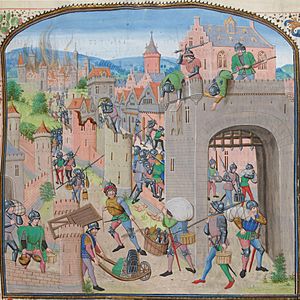Aymon of Ortinge facts for kids
Aymon of Ortinge, also known as Amanieu d'Ortigue, was a French mercenary captain during the Hundred Years' War. His story is mentioned in the famous Froissart's Chronicles.
He came from Gascony, a region in France. He might have been from a small village called Ortigues in Cézac.
Contents
Aymon of Ortinge: A Mercenary Captain
What Was a Mercenary?
A mercenary is a soldier who fights for money. They are not usually loyal to a specific country or king. Instead, they offer their fighting skills to whoever pays them. During the Middle Ages, many mercenaries were active, especially during long wars.
Life During the Hundred Years' War
Aymon of Ortinge lived during the Hundred Years' War. This was a very long conflict between England and France. It lasted for more than 100 years, from 1337 to 1453. Many soldiers, including mercenaries like Aymon, fought in battles across France.
The Tard-Venus Group
After a peace agreement called the Treaty of Brétigny was signed in 1360, many soldiers suddenly had no work. Aymon and his men were among them. These unemployed soldiers often formed groups. They became known as the "Tard-Venus" (which means "Latecomers").
These groups roamed the French countryside. They often took supplies and goods from towns and villages. This was a difficult time for many people living in France.
His Final Days
On May 11, 1369, Aymon of Ortinge faced a serious situation. He, along with two other men named Noli Pavalhon and Guyonnet de Pau, were accused of plotting against a powerful leader. This leader was Louis, the Duke of Anjou.
They were said to have worked with other groups of soldiers, like Le Petit Meschin and Perrin de Savoie. The goal was to hand over the Duke to the English forces. Because of this serious accusation, Aymon and his companions were executed.


